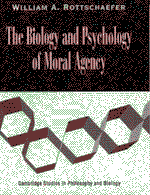Book contents
- Frontmatter
- Contents
- Preface
- Introduction
- PART I MORAL AGENCY AND SCIENTIFIC NATURALISM
- PART II THE BIOLOGICAL BASES OF MORAL AGENCY
- PART III THE PSYCHOLOGICAL BASES OF MORAL AGENCY
- 5 Behaviorally based moral capacities: How do we learn to behave morally?
- 6 The social cognitive bases of morality: How do we learn to act morally?
- 7 The neurophysiological bases of moral capacities: Does neurophysiology have room for moral agents?
- PART IV A SCIENTIFIC NATURALISTIC ACCOUNT OF MORAL AGENCY
- PART V INTEGRATING A PERSONALISTIC AND NATURALISTIC VIEW OF MORAL AGENCY
- References
- Index
7 - The neurophysiological bases of moral capacities: Does neurophysiology have room for moral agents?
Published online by Cambridge University Press: 19 September 2009
- Frontmatter
- Contents
- Preface
- Introduction
- PART I MORAL AGENCY AND SCIENTIFIC NATURALISM
- PART II THE BIOLOGICAL BASES OF MORAL AGENCY
- PART III THE PSYCHOLOGICAL BASES OF MORAL AGENCY
- 5 Behaviorally based moral capacities: How do we learn to behave morally?
- 6 The social cognitive bases of morality: How do we learn to act morally?
- 7 The neurophysiological bases of moral capacities: Does neurophysiology have room for moral agents?
- PART IV A SCIENTIFIC NATURALISTIC ACCOUNT OF MORAL AGENCY
- PART V INTEGRATING A PERSONALISTIC AND NATURALISTIC VIEW OF MORAL AGENCY
- References
- Index
Summary
Having solved the investigative dilemma facing scientific students of moral agency, thereby avoiding an ill-fated choice between a scientifically adequate but morally irrelevant account of agency and a morally relevant but scientifically inadequate account of agency, I concluded the previous chapter on a note of cautious optimism. The solution came by showing that a four-level model of moral agency based on Bandura's social cognitive theory of agency not only provides empirically well-grounded answers to major questions about how humans acquire and put into action their capacities as agents, but also more than meets the criteria for what counts as moral agency. However, my optimism is necessarily tempered by the realization that the investigative dilemma is only part of a larger challenge, what I call the reductionist predicament, facing any scientific naturalistic account of moral agency that takes as its goal to do justice both to the phenomenon of moral agency and to the scientifically established facts of agency. Reductionists and eliminativists are suspicious of the scientific adequacy of the psychological theories that I have invoked in the solution of the investigative dilemma. They question the scientific adequacy of theories that are formulated in terms of intentionalistic categories, whether of the folk psychological or of the information processing sort, or some combination thereof.
- Type
- Chapter
- Information
- The Biology and Psychology of Moral Agency , pp. 154 - 184Publisher: Cambridge University PressPrint publication year: 1997



